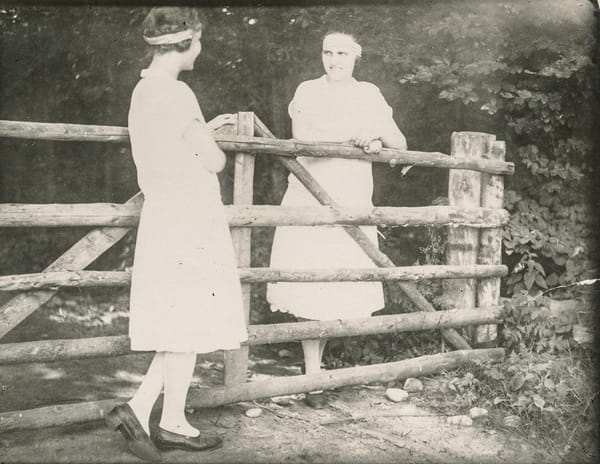Till Death Do Us Part? What the Bible Really Says About Marriage
When it comes to marriage, everyone from relationship experts to your nosy aunt has an opinion. But have you ever wondered, "What does the Bible actually say about marriage?"

Brace yourself for some surprises as we dive into the ancient wisdom of the scriptures to uncover the divine blueprint for matrimonial bliss.
When we think of marriage in the Bible, Adam and Eve often come to mind, but there's another story that's just as enlightening and perhaps even more dramatic. Let’s dive into the tale of Ruth and Boaz, a lesser-known but powerful narrative that offers profound insights into love, loyalty, and the sacred bond of marriage.
The Story of Ruth and Boaz: Love in the Barley Fields
The book of Ruth, set during a time of famine and hardship, tells the story of a young widow named Ruth. Instead of returning to her family after the death of her husband, Ruth chooses to stay with Naomi, her mother-in-law, uttering the famous words, “Where you go, I will go; where you stay, I will stay.”
Their journey leads them back to Bethlehem, Naomi's homeland, where Ruth, in a twist of fate, meets Boaz while gathering barley. Boaz is not just a kind man but also a 'kinsman redeemer,' meaning he has the right to marry Ruth to preserve the lineage of her deceased husband.
A Union of Respect and Kindness
Boaz is struck by Ruth’s dedication to Naomi and her hard work. He ensures her protection and offers her food, showing respect and kindness that was countercultural for the time. Their story isn’t just about romance; it’s about mutual respect, care, and a deeper understanding of commitment.
The Wedding That Changed History
Eventually, Boaz and Ruth marry, a union that not only provides security for Ruth and Naomi but also has historical significance. Ruth, a Moabite and a foreigner, becomes the great-grandmother of King David, demonstrating that love and faithfulness can break barriers and change destinies.
Lessons for Modern Marriages
The story of Ruth and Boaz teaches us about loyalty, kindness, and the willingness to go beyond societal norms. It shows us that true love involves commitment and care, transcending cultural and personal barriers. Their story is a testament to the fact that in the Bible, marriage is not just a contract but a covenant filled with potential for blessings and change.
Surprising Bible Verses About Marriage and Their Modern-Day Wisdom
Song of Solomon 2:16: "My beloved is mine, and I am his; he grazes among the lilies."
Practical Application: This verse celebrates mutual possession and deep love in marriage. It suggests a relationship where both partners feel equally valued and cherished. In practical terms, this means continually nurturing the romantic and intimate aspects of your marriage, ensuring that both partners feel loved and important.
Proverbs 15:17: "Better a small serving of vegetables with love than a fattened calf with hatred."
Practical Application: This verse suggests that the emotional environment of the home is more important than material wealth. In marriage, this means prioritizing a loving and caring relationship over material gains or the pursuit of wealth. True happiness in marriage comes from the quality of the relationship, not the quantity of possessions.
James 1:19-20: "Everyone should be quick to listen, slow to speak and slow to become angry, because human anger does not produce the righteousness that God desires."
Practical Application: This verse provides wisdom on communication within marriage. It encourages spouses to listen more and speak less in conflicts, and to control their anger. Practically, this means giving your partner your full attention, being patient in conversations, and avoiding hasty responses that are driven by anger.
Ecclesiastes 4:9-12: "Two are better than one, because they have a good return for their labor: If either of them falls down, one can help the other up. But pity anyone who falls and has no one to help them up."
Practical Application: This verse highlights the importance of companionship and support in marriage. It reminds us that one of the key strengths of a marital relationship is the mutual support system it provides. In day-to-day life, this means being there for each other, both in times of success and in times of difficulty.
Proverbs 21:9: "Better to live on a corner of the roof than share a house with a quarrelsome wife."
Practical Application: This proverb, while somewhat humorous, underscores the importance of peace and harmony in a household. It suggests that constant arguing can make home life unbearable. The practical takeaway is to cultivate a peaceful and respectful atmosphere in your relationship, learning to resolve conflicts constructively rather than letting them escalate.
1 Peter 4:8: "Above all, love each other deeply, because love covers over a multitude of sins."
Practical Application: This verse teaches the power of deep love to overlook and forgive faults. In marriage, this means practicing forgiveness and patience, understanding that everyone makes mistakes, and choosing to focus on love and understanding rather than on each other's flaws.
Ephesians 5:21: "Submit to one another out of reverence for Christ."
Practical Application: Often overlooked in discussions about marital roles, this verse speaks to mutual submission – where both spouses respect and yield to each other. It implies a partnership based on mutual respect and consideration, where decisions are made together, and each person’s opinion is valued.
Proverbs 17:14: "Starting a quarrel is like breaching a dam; so drop the matter before a dispute breaks out."
Practical Application: This verse is a reminder of the destructive power of arguments in a marriage. It suggests that sometimes, it’s wiser to let go of trivial issues before they escalate into bigger conflicts. In practical terms, this means choosing your battles wisely and focusing on maintaining harmony over winning an argument.
1 Corinthians 7:3-5: "The husband should fulfill his marital duty to his wife, and likewise the wife to her husband. Do not deprive each other except perhaps by mutual consent and for a time, so that you may devote yourselves to prayer. Then come together again so that Satan will not tempt you because of your lack of self-control."
Practical Application: This passage talks about the importance of physical intimacy in marriage and the mutual responsibility of spouses to each other's needs. It emphasizes the importance of maintaining a healthy sexual relationship and open communication regarding each other’s needs and desires.
Song of Solomon 8:7: "Many waters cannot quench love; rivers cannot sweep it away. If one were to give all the wealth of one’s house for love, it would be utterly scorned."
Practical Application: This poetic verse from the Song of Solomon emphasizes the strength and endurance of true love. In marriage, it encourages couples to recognize that their love for each other is a powerful force that can withstand challenges and difficulties. It also highlights the value of love over material possessions or wealth.
Each of these verses offers a unique perspective on marriage, encouraging practices like patience, understanding, effective communication, and the prioritization of love and emotional well-being in the marital relationship.
Marriage Mysteries Solved: Your Ultimate FAQ on What the Bible Really Says
- How is marriage defined in the Bible?
In the Bible, marriage is primarily defined as a sacred covenant, a lifelong commitment between a man and a woman. It is portrayed not just as a legal contract but as a spiritual and relational bond that is blessed and ordained by God. Key aspects of how marriage is defined in the Bible include:
A Covenant Relationship: Marriage is often seen as a covenant, which is more than a mere agreement or contract. It is a solemn, binding commitment made before and under the guidance of God. This is evident in verses like Malachi 2:14, where marriage is explicitly called a covenant.
Lifelong Union: The Bible portrays marriage as a lifelong union. This is emphasized in Genesis 2:24, where it says, "Therefore a man shall leave his father and his mother and hold fast to his wife, and they shall become one flesh." Jesus also reiterates this in Matthew 19:4-6, affirming the permanence of the marital bond.
Partnership and Mutual Support: Marriage is seen as a partnership where both individuals support and complement each other. Proverbs 31:10-31 speaks of a wife of noble character who is valued and plays a vital role in the household.
Faithfulness and Exclusivity: The Bible emphasizes faithfulness within marriage. Adultery is condemned in the Ten Commandments (Exodus 20:14), highlighting the importance of exclusivity and fidelity.
Procreation and Family: One of the purposes of marriage in the Bible is procreation and the creation of a family, as indicated in Genesis 1:28, where God tells Adam and Eve to "be fruitful and multiply."
Reflecting Divine Love: Christian teachings often view marriage as a reflection of the relationship between Christ and the Church, representing love, sacrifice, and unity, as described in Ephesians 5:22-33.
Moral and Social Framework: Biblically, marriage provides a moral and social framework for sexual relations and the upbringing of children, contributing to the stability and health of society.
- What are the rules of marriage in the Bible?
The Bible outlines several principles and rules regarding marriage, offering guidance on how to build and maintain a healthy marital relationship. These biblical rules focus on aspects like commitment, fidelity, mutual respect, and love. Here are some key rules of marriage as presented in the Bible:
- Lifelong Commitment: Marriage is viewed as a lifelong union. Genesis 2:24 states that a man shall leave his parents to be united with his wife, and they shall become one flesh, highlighting the permanence and exclusivity of the marital bond.
- Mutual Love and Respect: Ephesians 5:22-33 discusses the reciprocal nature of marital relationships, instructing husbands to love their wives as Christ loved the church and wives to respect their husbands. This mutual love and respect are fundamental to a healthy marriage.
- Fidelity and Exclusivity: The Bible strictly prohibits adultery. The Seventh Commandment, "Thou shalt not commit adultery" (Exodus 20:14), emphasizes the importance of fidelity within marriage.
- Equal Partnership: While the Bible does speak about roles within marriage, it also emphasizes the idea of partnership and equality under God. Galatians 3:28, for example, notes that in Christ, there is neither male nor female, suggesting an essential spiritual equality.
- Resolving Conflicts Peacefully: The Bible encourages resolving conflicts amicably and with love. Colossians 3:13 advises believers to bear with each other and forgive one another, a principle that applies directly to marriage.
- Provision and Care: Husbands are called to provide for their families, as noted in 1 Timothy 5:8. This provision is not just material but also emotional and spiritual.
- Sexual Intimacy: Sexual relations are to be enjoyed exclusively within the bounds of marriage. The Bible views sexual intimacy as an important part of the marital relationship (1 Corinthians 7:3-5).
- Avoiding Unequal Yoking: 2 Corinthians 6:14 warns against being "unequally yoked" with unbelievers. This has been interpreted as advice to ensure that marital partners share a common faith, which is seen as crucial for a harmonious and spiritually aligned relationship.
- Divorce Only in Certain Circumstances: While the Bible does permit divorce in certain situations, such as marital unfaithfulness (Matthew 19:9), it generally promotes the ideal of marriage as a lifelong commitment.
- Parental Duties: The Bible discusses the importance of raising children in a godly manner, which is a shared responsibility of both parents within a marriage.
- Is 'Til Death Do Us Part' Actually in the Bible?
The phrase "Til Death Do Us Part" is commonly heard in traditional wedding vows, particularly in Christian marriage ceremonies, but this exact phrase does not appear in the Bible. The concept behind the phrase, however, aligns with biblical teachings on the lifelong commitment of marriage.
The idea of marriage as a lifelong bond is indeed supported by various passages in the Bible. For example, in Matthew 19:6, Jesus says, "So they are no longer two, but one flesh. Therefore what God has joined together, let no one separate." This emphasizes the enduring nature of the marital union.
The traditional wedding vows, including "Til Death Do Us Part," were formulated to reflect these and other biblical principles about marriage being a lifelong and unbreakable covenant. While the specific wording might not be found in the scriptures, the sentiment of a permanent, lifelong commitment is very much in line with biblical teachings on marriage.
- Can You Guess Which Bible Verse Is Most Quoted at Weddings?
The most frequently quoted Bible verse at weddings is 1 Corinthians 13:4-7, often referred to as the "Love Chapter." This passage is celebrated for its beautiful and poignant description of what true love entails. The verse reads:
"Love is patient, love is kind. It does not envy, it does not boast, it is not proud. It does not dishonor others, it is not self-seeking, it is not easily angered, it keeps no record of wrongs. Love does not delight in evil but rejoices with the truth. It always protects, always trusts, always hopes, always perseveres."
This passage is a favorite for wedding ceremonies as it encapsulates the ideals of love and commitment that are central to marriage. Its poetic description of love as enduring, forgiving, and selfless resonates deeply with the union being celebrated.
- What Does the Bible Say About Marrying Your Cousin?
- The Bible does not provide a clear, direct statement about marrying a cousin, and views on cousin marriage have varied among different Christian denominations and cultures throughout history. In the Bible, there are instances where marriage between relatives occurs. For example, Isaac married Rebekah, his first cousin once removed (Genesis 24). However, these instances are part of historical narratives rather than prescriptive texts giving specific rules about marriage.
In the book of Leviticus, the Bible outlines prohibited marital relationships (Leviticus 18), which primarily focus on immediate family members such as a parent, sibling, or child. The prohibitions in Leviticus are generally interpreted as focusing on close familial relations, but they do not explicitly include cousins.
In modern times, the legality and acceptance of cousin marriage vary widely based on cultural, legal, and religious factors. In some cultures and communities, cousin marriages are traditional and widely accepted, while in others, they are discouraged or legally restricted.
- Bible's Take on Soulmates: Myth or Divine Truth?
The concept of soulmates, as often depicted in popular culture, isn't directly addressed in the Bible. The idea of a predestined, perfect partner designed for each individual doesn't have a specific biblical basis. However, the Bible does speak extensively about love, marriage, and the qualities of a good partner, offering principles that can guide individuals in their relationships.
- Does the Bible Really Say Anything About Living Together Before Marriage?
The Bible doesn't specifically mention living together before marriage, or cohabitation, like we know it today. But it does talk about how sexual relations are meant for marriage and that marriage is something special and sacred. For example, it says that sex should only happen between married people, which many interpret as not supporting living together before marriage if it involves a sexual relationship. The Bible's big on the idea of marriage being a committed, public partnership and not just something private or casual. So, while it doesn't directly say "don't live together before getting married," the general message about sex and marriage kind of suggests that.
- What 'Submit to Your Husband' Means?
The phrase "Submit to your husband" comes from Ephesians 5:22 in the New Testament of the Bible, where it says, "Wives, submit yourselves to your own husbands as you do to the Lord." This verse and the concept of submission in marriage have been widely discussed and interpreted in various ways within the Christian community. Here’s a closer look at its meaning:
- Context of Mutual Submission: It's important to read this verse in the context of Ephesians 5:21, which precedes it: "Submit to one another out of reverence for Christ." This suggests that submission in marriage is not one-sided but mutual. The call for wives to submit to their husbands comes within the broader context of both partners submitting to each other.
- A Loving Leadership: In the verses following Ephesians 5:22, husbands are instructed to love their wives as Christ loved the church, even to the point of giving up his life for her. This indicates that a husband’s leadership in a marriage should be characterized by love, sacrifice, and selflessness, not authoritarian control.
- Cultural Context: The concept of submission must be understood within the cultural context of the time when the Bible was written. In the ancient world, the societal structure was different, and these teachings addressed the relationships within that specific cultural framework.
- Modern Interpretations: In contemporary discussions, many theologians and Christian counselors interpret "submission" in marriage not as blind obedience or inferiority, but as a willing cooperation and respect toward one's husband, recognizing the partnership and equality within the marriage. It's about working together, with each person playing their role in the relationship.
- Equality and Respect: The broader biblical principle is that of mutual respect, love, and care in marriage. Both partners are called to value and honor each other, each bringing their strengths and uniqueness to the relationship.
Conclusion: Embracing Faithful Love - A Prayer for Guidance on Marriage in the Bible
As we conclude our exploration of what the Bible says about marriage, let's join in a simple prayer for anyone seeking guidance on this sacred union:
Dear God,
As I seek to understand Your will and wisdom about marriage through the Bible, guide my heart and mind. Help me to grasp the true meaning of love, commitment, and partnership as You intended. Show me how to apply these teachings in my life, and lead me towards a relationship that honors You.
Bless me with patience, understanding, and a loving heart, so that I may embrace the joys and challenges of a faithful marriage. May my journey in love and companionship reflect Your grace and goodness.
Amen.
Simple prayers for guidance, a partner who shares faith, strength in tough times, and happiness in marriage...
Prayer for Clear Understanding
"Dear Lord, guide my heart as I learn about marriage from Your Word. Bless me with a special understanding so that I can build a marriage full of love and joy, just as You want. Thank You for being with me on this journey. Amen."
Prayer for a Godly Bond
"Heavenly Father, I dream of a marriage that shines with Your love. Lead me to someone who shares my love for You, so together we can create a beautiful life that honors You in every way. Bless our future together. Amen."
Prayer for Making the Right Choice
"God, in my search for a life partner, fill my heart with Your wisdom. Help me recognize the one You have chosen for me, someone who will walk with me in faith and love. I trust in Your perfect plan for my life. Amen."
Prayer for Overcoming Challenges and Getting Through Tough Times
"Loving God, I know that every marriage faces tough times. Please give me and my future spouse the strength to overcome these challenges. Let Your presence be our comfort and guide, keeping our bond strong and true. Amen."
Prayer for a Happy Marriage
"Lord, my heart is full of hope for a marriage that’s a reflection of Your joy. Guide us to share laughter, love, and happiness every day, cherishing each moment we have together. May our marriage be a beacon of Your love. Amen."
More of God's Word
Marriage bible verses
What does the Bible say about sex before marriage
What does the Bible say about same sex marriage
What does the Bible say about homosexuality
What does the Bible say about divorce
What does the Bible say about love
What does the Bible say about interracial marriage
What does the Bible say about a wife
What does the Bible say about a husband
What does the Bible say about women
What does the Bible say about adultery
What does the Bible say about relationships




